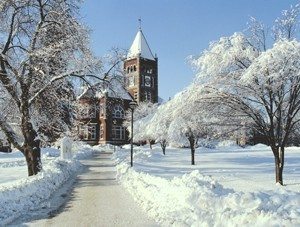Case Study
University of New Hampshire
 Founded in 1866, the University of New Hampshire is a vibrant land-, sea- and space-grant university that is ranked among the top-tier research institutions nationally. The University’s two campuses in Durham and Manchester serve an annual enrollment of approximately 14,500 students mentored by 1,000 full- and part-time faculty members.
Founded in 1866, the University of New Hampshire is a vibrant land-, sea- and space-grant university that is ranked among the top-tier research institutions nationally. The University’s two campuses in Durham and Manchester serve an annual enrollment of approximately 14,500 students mentored by 1,000 full- and part-time faculty members.
Created in 1997, the UNH Office of Sustainability is the oldest endowed sustainability program in higher education in the United States. In May 2006, UNH was also the first institution of higher education in the nation to receive ENERGY STAR® ratings for residence halls. It now has eight U.S. EPA ENERGY STAR buildings and another in the process of certification. UNH mandates that all buildings meet LEED-Silver or equivalent requirements.
As part of its comprehensive and committed sustainability efforts, the University wanted to reduce the amount of compostable trash and food waste collected annually and compost as much as possible.
In keeping with the University’s Climate Action Plan, it wants to cut its greenhouse gas emissions 50 percent by 2020 and 80 percent by 2050 on the road to carbon neutrality by 2100. A recycling and food-waste composting program was needed as part of the university’s sustainability effort to help reduce trash volume, waste-removal costs, and greenhouse gas emissions to reach the 2100 goal.
The University utilized Somat close-coupled pulpers/hydra-extractor systems. Comprised of a pulper directly connected to a hydra-extractor, these stand-alone foodservice waste units provide a convenient means to reduce waste volume at the collection source where facility constraints do not permit more centralized food-waste collection. Three Somat pulper/hydra-extractor systems were put into service in each dining hall.
Each meal served in the dining halls generates approximately half a pound of compostable food waste, and all of it is reclaimed for composting. This waste is scraped into a water-filled trough, and the slurry is sent through highly energy-efficient waste-reduction pulpers equipped with dewatering systems that separate the solid waste and return the slurry to the trough to be recycled. Macerated and partially dewatered pulp is output directly into reusable plastic trash containers. Student interns collect this dewatered pulp from the UNH campus and compostable trash from local restaurants daily, and then they take it to a reclamation facility for composting. It is then used to produce a rich soil amendment for the University’s organic farming program.

